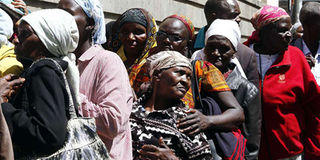Ministry steps up efforts to tackle ageing crisis as elderly count soars

Elderly people queue outside the Kenya Commercial Bank in Nakuru on March 28, 2017 to receive their Sh2, 000 monthly stipend. As the number of senior citizens soars, the government is putting up measures to tackle the ageing crisis. PHOTO | SULEIMAN MBATIAH| NATION MEDIA GROUP
What you need to know:
- Speaking in Dagoretti over the weekend, Director of Social Development Josephine Muriuki said the government was continuously revising the care programmes for needy groups to ensure as many of them as possible benefit.
- Although more than 300,000 have been receiving the cash, the government plans to increase the number by nearly two times, following a decision to provide for all those aged 70 years and above.
- Ms Ndwiga suggested that the authorities work out a system that can regularly bring together elderly people in their communities to interact and share their experiences as part of their emotional care.
The growing ageing population is likely to put further pressure on families and the State to provide quality livelihoods for the senior citizens.
And as the country celebrates the International Day of Older Persons this week, data from the State Department of Social Protection, indicate that a total of Sh7.3 billion was spent as stipend on the older people in all counties last financial year alone.
The money was spent on 310,000 beneficiaries.
Speaking in Dagoretti over the weekend, Director of Social Development Josephine Muriuki said the government was continuously revising the care programmes for needy groups to ensure as many of them as possible benefit.
“We are totally committed to ensure that our disadvantaged populations are cushioned to live quality lives,” she said at a function where elderly people were exhibiting their talents.
DECENT LIFE
And speaking at another function to celebrate the older persons in Kajiado on Sunday, HelpAge International population expert Erastus Maina, whose organisation deals with the elderly, warned that massive resources will be needed to ensure the senior citizens live a decent life.
“We know the government is doing a good job with the cash transfer programme but we need to do more as the Sh2,000 monthly stipend provided is a drop in the ocean,” said Mr Maina.
Last week, the government announced it had set aside a further Sh6.5 billion for the Inua Jamii programme that will benefit the elderly.
Although more than 300,000 have been receiving the cash, the government plans to increase the number by nearly two times, following a decision to provide for all those aged 70 years and above.
According to a confidential government report dated September 6, the government has already started preparing for the planned roll-out of the cash transfer programme, expected to be launched if Mr Uhuru Kenyatta is re-elected president for a second term.
LEGAL FRAMEWORK
According to the Jubilee manifesto, the programme will start in January 2018.
On Sunday, Mr Maina, called on the government to come up with a legal framework to guide the cash transfer programme to ensure it is entrenched in the country’s laws.
“We are happy at the progress of the programme but we do not want it to be owned by any one regime,” he said.
Mr Maina urged the country to robustly discuss the issues of the older people this week, when the apex of the celebrations would be a national meeting in Kajiado on Thursday that will be attended by senior government officials.
He called on the government to provide health insurance to all the beneficiaries as only 42,000 of the elderly were currently covered.
LONELINESS
Population expert Margaret Ndwiga said older people were suffering loneliness in the villages as their children migrated to towns in search of jobs.
“I come from a village where I witness first hand how the older people are depressed at their loneliness,” she said.
Ms Ndwiga suggested that the authorities work out a system that can regularly bring together elderly people in their communities to interact and share their experiences as part of their emotional care.
“Our older people are suffering from psychological issues as they feel abandoned,” she said.
“Some go without food,” Ms Ndwiga said, adding that famine affected older people most, especially in the arid and semi-arid areas.
LIVE LONGER
She said Kenyans now live longer as a result of better health and food provision.
In total, the government has spent Sh25.7 billion on the programme since it was introduced in 2008, initially with only 200 beneficiaries.
About Sh24 billion has been spent on the programme over the past four years.
Early this year, National Treasury Cabinet Secretary Henry Rotich said “all persons above the age of 70 years will receive a cash transfer in the form of a monthly stipend and National Hospital Insurance Fund cover that will be paid by the government.”
So far, the programme has targeted poor and vulnerable older persons of 65 years and above.
BENEFICIARIES
According to the data for the financial year 2015/2016, Kilifi County with a total of 20,629 beneficiaries had the highest number of older beneficiaries in the programme.
It was followed by Machakos which had 14,688 while Kitui was third with 13,264 older citizens.
Lamu County recorded the least number of beneficiaries at 1,339, while Laikipia had the second least number, of 2,249 beneficiaries.
The cash transfer programme to older persons started in 2007 with the objective of providing regular and predictable cash transfer to vulnerable older persons in identified households has exceeded expectations.
Social safety nets for the elderly are crucial, given that the collapse of traditional family ties has resulted in more senior citizens being left to fend for themselves, especially in the rural areas.





